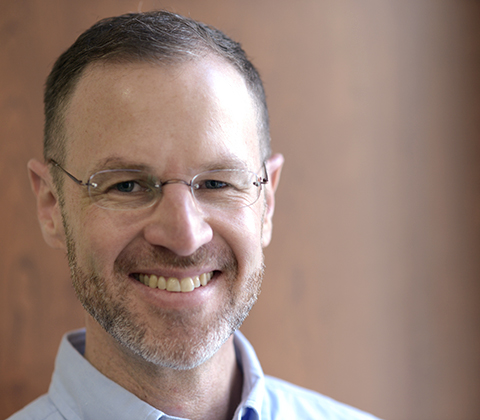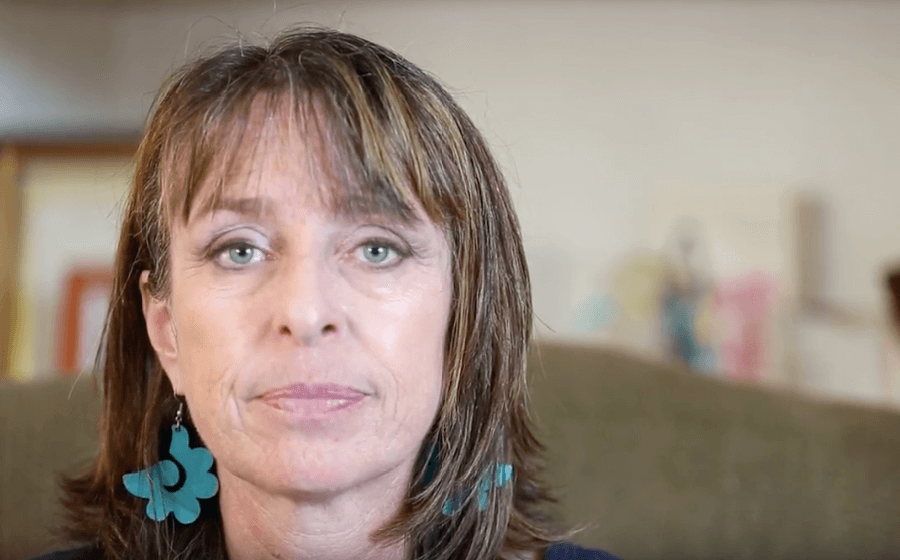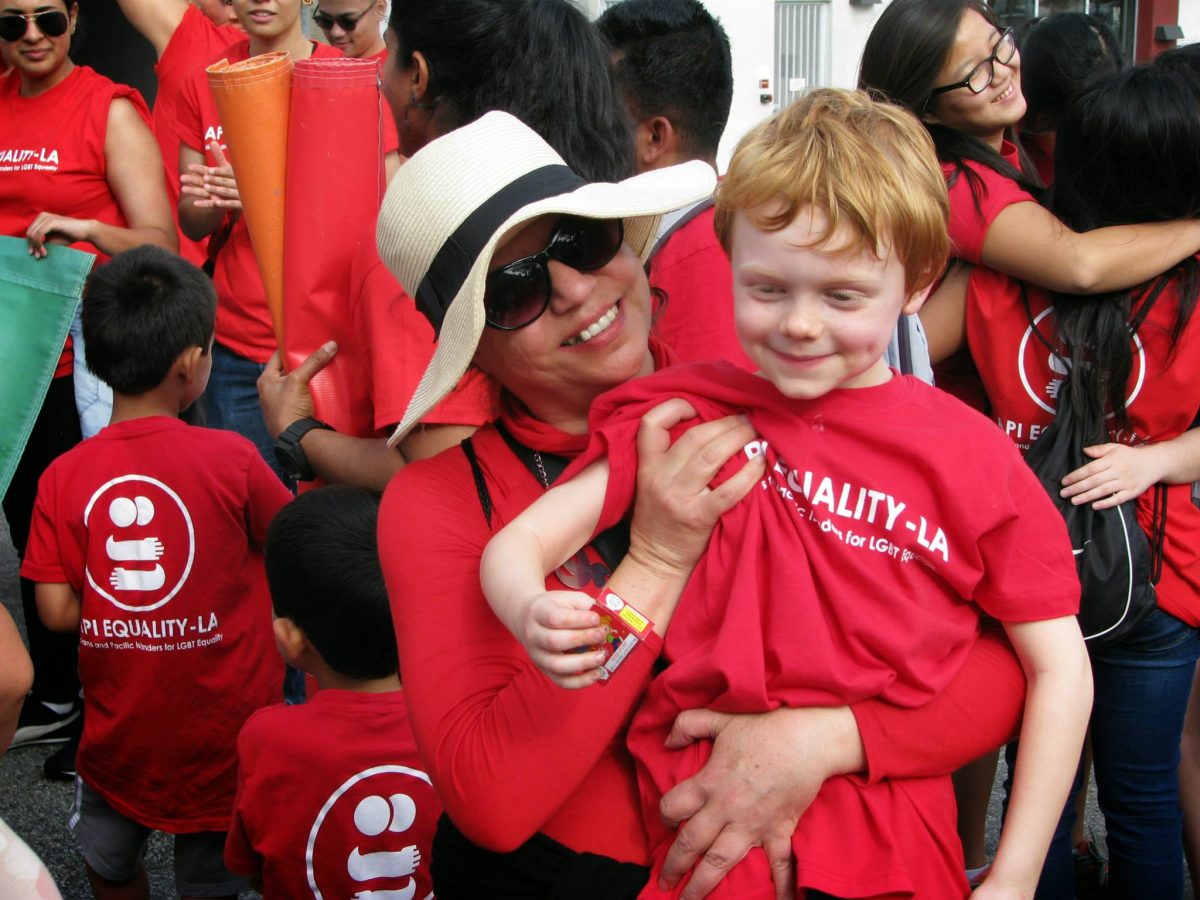Location: Los Angeles
Gay and Lesbian Media Coalition
Black Gay and Lesbian Leadership Forum
Lisa Udelson
We All Fall Down
Mitch Singer
“Being in this world, being in philanthropy for almost 20 years you tend to kind of collect the organizations that speak to your heart and Astraea is one of them.”
How did you come to know Astraea?
Being in this world, being in philanthropy for almost 20 years you tend to kind of collect the organizations that speak to your heart and Astraea is one of them. And so it’s been a process of learning about them gently or learning them gradually, of learning first kind of, “Okay so this is what they’re about, they’re the Lesbian Foundation for Justice.” And then, “Okay, but what does that mean?” And then learning that they’re international and then learning about the people involved and learning about their projects. It was an unfolding. Every time it would unfold further there was another, “Ah-ha!”
Then Bob [Astraea’s Executive Director] came on and I interviewed her for this project that I was doing and I thought, oh! “I don’t wanna get off the phone!” We could have kept talking for hours about all of the amazing work that she’s been doing, that she wants to see being done in the world, that I‘d love to see being done in the world. There are not a lot of partners out there that you can kind of feel that way about. She is one of them and Astraea’s one of them. So are the organizations that Astraea partners with. It’s just been a wonderful learning and growing experience just knowing them.
What are the things about Astraea that you connect with?
It’s the whole comprehensive view that they take toward their issues and it’s the particular. It’s being really particular in calling out things like gender discrimination and poverty. Not shying away from things that might make people uncomfortable but hitting them head on and being bold about that. And at the same time, understanding that it takes all of that, that it’s not about one identity or one person. It’s the whole package and it’s attending to issues at so many different levels and it’s the curiosity about learning more, about saying, “Okay, we get that there is an issue because of this going on, because of income inequality or gender or sexual orientation. We get that there’s that issue, but what’s behind it and how is it affecting people in different ways?” It’s that curiosity and boldness, and attention to detail, and really noticing what specifically needs to happen.
In your lifetime, what political/social gains have been made, and if you can reference to just a few specifics as you walk us through?
The policy changes that we’ve seen have been extraordinary. None of us thought it would happen this quickly. It has been amazing and wonderful, and I feel privileged to see them. But really, what I’m most struck by is the cultural changes that we’ve seen. And also it reminds me of how much further we have to go. But around homophobia, we have seen an expectation change dramatically, from when I was young to where we are now where it simply it is not acceptable to be homophobic. I don’t think we’ve seen the same changes around misogyny, which I would love to see. I think that homophobia and misogyny are of course linked, and so I see that as unfinished work or even, I would say, barely started work.
Which is why having a focus on lesbian justice, women, and girls is so important to me because I see women as leading that fight. And when we get farther along, I think we’re all gonna see about how gender has been so damaging, the construct of gender has been holding us all back. And it will affect all of us when we have a much more nuanced and mature view of that. And I see Astraea and the work of its partners, leading that.
Why is it important to give big or small dollars, at any level?
The process of giving itself is an opportunity to engage, and to learn, and to grow. You can do that at any level. It’s less about the exact amount of money. It’s more about the ability to learn, and grow, and to engage, and that’s what giving provides.
Lynn Ballen
“Astraea was the organization that we came to because of our shared values with how Astraea puts all of their work into effect.”
How are you connected to Astraea?
My partner and I established a fund in her name before she passed. And we’ve been donors and supporters in the past, but she passed away in January and in the years before that we were looking for a place to fulfill some promises that she had made to herself and to the community about giving half of her estate back to community organizations and social justice. Astraea was the organization that we came to because of our shared values with how Astraea puts all of their work into effect.
What were the promises that Jeanne made to herself?
Jeanne was planning to be a nun when she left high school and she had some really deeply held beliefs about making vows and setting goals and also giving back in a sense. She had created the Community Yellow Pages which was, in some ways, a very unintentionally successful business. She began it as a political action. She felt that the community had given to her and she wanted to give back. Jeanne also had a sense of being a parent and a mentor to younger generations of lesbians, LGBTI, and queer young folk. To her, they were her children and rather than leaving her estate to, as she once said very humorously, “To some random heterosexual niece or nephew that you don’t really know very well.” She felt that she wanted to leave her legacy and seed money for younger generation who were coming up behind her.
Where and when did the two of you meet? What was the first thing that you noticed about her?
That’s a funny story. We met in the fall of 1989. We met in a women’s therapy group. Jeanne was always asked, “Oh, was it a lesbian therapy group?” And she had to admit, “No.” It was actually a straight therapy group. She joined the group because she had been referred to this particular therapist who was doing work that she needed to do. She also joked that she had slept with most of the lesbian therapists in Los Angeles. She had boundary issues.
The first time we met, I had just come back from South Africa. My dad had been very ill. I walked back into the group and the group was very charming and kind… except for this one new person who was sitting there wearing a hat and boots and had completely different energy than everybody else in the group. She leaned forward very intently and looked at me and said, “Well, do you have closure with your father?” And I was like, “Who is this person and how dare she asking me such an honest, strong, clearly purposeful question?” And that’s how I noticed her.
What happened after that? How did you guys keep noticing one another?
After therapy group, all these women, or several of the women from the therapy group would go out to Marie Callender’s down the street and go for coffee. I kept noticing that me and this woman were the last two always there. We were having the most interesting conversations, we were closing down Marie Callender’s at whatever time they closed. 11:00 PM, I guess. While ordering a whole bunch of cornbread, it became clear that we were really interested in each other even though we were in a therapy group where you were supposed to not be having any kind of romantic entanglements with your fellow group members. For me, it was the fact that we started out being friends first, that was really important. I was newly coming out, and about 13 years younger than Jeanne. She was famous in the community; she had a reputation. There were lots of stories about her. It was probably better that I didn’t know any of them when I met her.
What were your shared values?
Community and giving back to something larger than yourself. We also shared values around standing up against injustice, and the importance of being a part of a movement that may change and brought people together. I think that Jeanne talked often about her work coming out of her own oppressions. I think she came out of being butch and Chicana in so many ways; different and struggling in her own family and struggling in the world. For me, I think, my attraction and connection to social justice came out of difficulties in my childhood and empathy from that that. So those combined values was always us seeing how we felt it was necessary to be of service in a way. To also step up and stand up for other folks.
Katrina Schaffer
“It is the wonderful work that they do collecting together all this information on all the different groups nationally and internationally that are applying social justice values to how they address the different problems that LGBT communities have.”
Tell us how you learned about Astraea.
I was drawn to the Astraea Foundation, at first, through a number of different, smaller grassroots local, queer and lesbian and trans groups and organizations with which I was involved. I went to their events and would often see Astraea as part of the groups that it had funded it. It offers small, struggling groups funding when it’s hard for them to get funding elsewhere.
The name had been on my radar for almost 15 years, since I was in my younger 20s. It was definitely a group that I had heard about and became more familiar with. And as I went into more donor organizing work, it was definitely a group that was coming up that had great social justice values and principles that they based their funding around. When I looked to open up my giving some more, that was one of the groups that I was excited to look into.
Can you talk a little bit about your background?
I grew up in Kansas City, Missouri, went to school in upstate New York where I studied art and video, and moved to New York City, where I lived for about 12 years. I mostly did camera work on documentaries about LGBT rights and documenting events and different actions for various projects, mainly a project that used to be around called Dyke TV in Brooklyn. I then decided to shift some gears and went into teaching. I worked at a school for the deaf as a teaching assistant and considering getting a teaching degree as I learned more about deaf community.
All the while, had always been very interested in animation and decided to move west to Los Angeles to get into the stop-motion animation world, and that’s where I’ve been for the last couple of years. I’ve also been involved in a number of other organizations and I would say that’s where my connection to social justice work tends to be.
What is it about Astraea that made you want to fund the work?
One part of it is the wonderful work that they do collecting together all this information on all the different groups nationally and internationally that are applying social justice values to how they address the different problems that LGBT communities have. There’s so much to learn about, So I’m really appreciative to have a group like the Astraea Foundation that is coming from a social justice standpoint and looking at LGBT rights, and involving intersectionality and a lot of that kind of analysis to find those groups. I can put my support into Astraea and know that it’s going to different groups like that. That makes me really comfortable giving money to them and to support the work that they do.
In Memoriam of Jeanne Cordova
Our thoughts are with Jeanne’s family and friends during this time of mourning, remembrance, celebration, and healing.

With sadness, we note the death of an extraordinary activist and friend, Jeanne Cordova. She passed away early Sunday morning at the age of 67, after a long battle with cancer. Our thoughts are with Jeanne’s family and friends during this time of mourning, remembrance, celebration, and healing.
Jeanne passionately advocated for sustaining the movements that supported her as a young Chicana-lesbian activist. “We need to think about giving to our gay or lesbian youth and institutions like Astraea or other lesbian organizations. They’re the ones who are nurturing our real daughters right now, around the world,” Cordova noted in “Letter About Dying to my Lesbian Communities,” which she shared with the public late this past summer.
At the same time of the letter’s publication, we announced Jeanne’s plans to donate an unprecedented estate gift — $2 million — to the Astraea Lesbian Foundation for Justice. Managed in collaboration with Astraea by her partner, Lynn Ballen, the Jeanne R. Cordova Fund will support communities and activists most dear to Jeanne.
Jeanne’s life was well-lived: she was an entrepreneur, a renowned author, a curator, a beloved partner, and a trailblazer in our community. Astraea is honored to celebrate her profound legacy and humbled to have played a small role in it.
“It is wonderful to have had a life’s cause: freedom and dignity for lesbians,” Jeanne wrote “we built a movement by telling each other our lives and thoughts about the way life should be. We cut against the grain and re-thought almost everything. With just enough left undone for our daughters to re-invent themselves.” Thank you, Jeanne, for this forward-going mandate, for your love and vision.
API Equality-LA
API Equality-LA is an LBGTQ rights and social justice organization building grassroots community power and organizing for change in Asian American and Pacific Islander (API) communities. Since 2005, API Equality-LA has organized in the greater Los Angeles area around issues affecting queer and trans APIs, including marriage equality, social and family acceptance, immigration, and access to health care. API Equality-LA brings a politicized lens to the work, channeling the political power of an active base of volunteers and leaders to address connected progressive issues. They create change through intergenerational community organizing with a focus on youth; leadership develop; public education; outreach and one-on-one conversations; and advocacy. API Equality-LA works toward a vision of an inclusive, equitable, and just society where all API LGBTQ people can thrive.
This organization is supported through the Funding Queerly Giving Circle, which is housed at Astraea.





